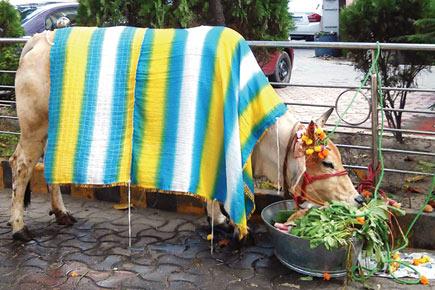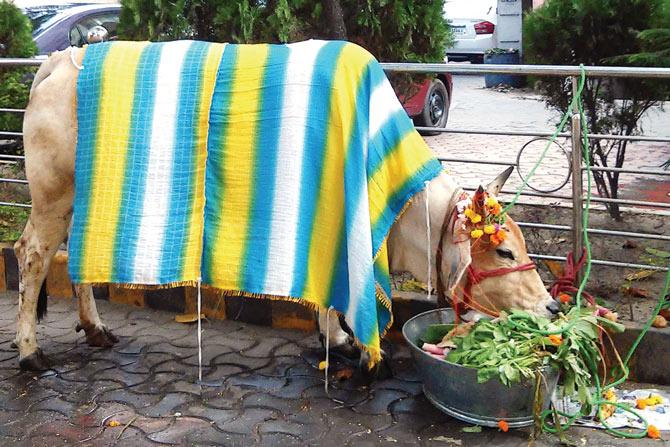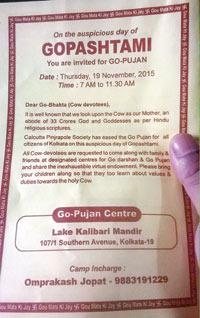This year's unprecedented scale of Gopashtami celebrations is raising questions whether Kolkata's cosmopolitan core is being periled by insidious political designs

The BJP top brass may have regrouped after the Bihar debacle to rethink its strategy for West Bengal’s crucial election in 2016, but its self-anointed foot soldiers are already at work in the state.
ADVERTISEMENT

A cow decorated for the occasion of Gopashtami on Thursday
Perhaps the most liberal and cosmopolitan city after Mumbai, Kolkata, has always been passionate about its festivals. Be it Christmas, or the Chinese New Year, Durga Puja or Bakri ID, or even the late Pope John Paul or soccer legend Pele’s visit, the city’s voracious appetite for celebrations, cutting across religious or cultural divides, is legendary. However, it was the scale of the Gopashtami festival that is raising questions if the city’s cosmopolitan core is threatened by insidious political designs.

A leaflet informing the locals about a Gau Puja centre at Lake Kalibari Mandir
For days, pamphlets, billboards and handouts had been circulating in various corners of the city, announcing the mega Cow event on Thursday, with a slogan that had curious political undertones – Ab Ki Bar, Saparivar. Worshipping the cow on this day of the Hindu calendar has been part of tradition. But this year, the organisers, the Calcutta Pinjrapole Society (CPS), a NGO set up in Kolkata in 1885 to shelter cows and now based in Bengal and Jharkhand, say they were besieged with requests from enthusiastic ‘Cow Devotees’ to bring the cow to their doorstep.
As a result, the CPS, which runs shelters or Gaushala in Sodepur, Liluah, and other places in the outskirts of the city, was ubiquitous in its presence. The Society’s general secretary, Purshottam Parasrampuria, said, “We have been organizing this festival for seven years now. But this year we had scaled things up considerably because emotions around Gau Mata are extremely high. From setting up Gau Pujan centres in nine places last year, we put up 61 this year to reach out to cow devotees who do not have access to any neighbourhood gau shala.”

Paroma Banerjee
The Gau Pujan centres were not confined to neighbourhood temples, but also popped in upscale condominiums, gated communities and Kali Bari complexes (interesting because devotees of Goddess Kali are avowed meat eaters and sacrificing bulls and other animals is part of the ritual). What became a talking point was the appearance of the travelling cow shrine into the heart of Kolkata elite and Bengali neighbourhoods in the South of Kolkata.
Cows, with individual handlers, were dressed up and decked up in garlands, and worshipped. In one of the gated residential complexes in East Kolkata, close to the Hyatt Regency hotel, the festive cow refused to budge from the parking lot. Office goers had to change their exit routes and residents to deal with the dung and urine passed by the captive animal that at one point refused to eat any more of the ceremonial offering. This scene had unfolded in a neighbourhood that is also home to a sizeable Muslim population.
Elsewhere, volunteers and camp coordinators set up kiosks selling coupons and donation boxes encouraging people to spend Rs 500- Rs 1,000 for a chance to contribute towards the cause of the holy cow.
Pamphlets and booklets extolling the virtues of the cow and explaining its religious and environmental significance were also available.
According to observers, the event was a top draw with the city’s thriving Marwari community and a section of the upper caste Bengali Hindus.
“But there is more to this,” points out popular TV and entertainment personality and singer Paroma Banerjee. Paroma, a resident of South Kolkata, says she has been watching with dismay and dread as political money is pumped into all religious festivals with an eye on next year’s assembly elections.
“Whether it is Durga Puja, Chhat Puja or Gau Puja, there is a lot of money that is changing hands. Money that ought to have been spent on creating jobs and reviving industries is only being used to buy votes,” she rues, adding that it would be difficult and foolhardy to impose a beef ban in the city of meat-loving Hindu Bengali and Muslim population.
But Parasrampuria claims the CPS has no political colours. “We are a free and independent organization,” when asked about the presence of Ramdev’s posters at the Gau Puja venues.
 Subscribe today by clicking the link and stay updated with the latest news!" Click here!
Subscribe today by clicking the link and stay updated with the latest news!" Click here!







